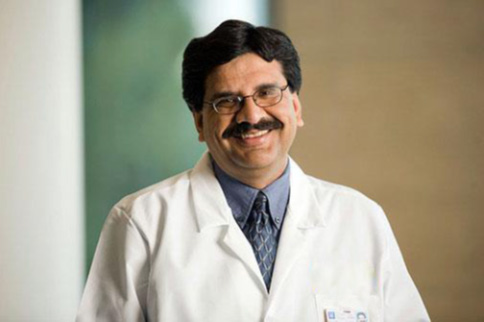 In January, Ravi Bhatia, M.D., will take the helm as director of the University of Alabama at Birmingham Division of Hematology and Oncology and as deputy director of the UAB Comprehensive Cancer Center. He will be the driving force responsible for delivering precision medical care to cancer patients and fostering breakthrough discoveries that could change the way cancer is treated.
In January, Ravi Bhatia, M.D., will take the helm as director of the University of Alabama at Birmingham Division of Hematology and Oncology and as deputy director of the UAB Comprehensive Cancer Center. He will be the driving force responsible for delivering precision medical care to cancer patients and fostering breakthrough discoveries that could change the way cancer is treated. For more than 25 years, Bhatia has been propelling cancer care forward, not just with the goal of getting patients through successful treatment, but also with the aim of completely ridding his patients of the disease. Recognized internationally for innovative research in leukemia and other blood disorders, Bhatia began his medical education at the All India Institute of Medical Science in New Delhi, India. He received hematology/oncology and bone marrow transplant training from the University of Minnesota, where he also did a postdoctoral fellowship.
“Ravi Bhatia is a dedicated and accomplished physician. His understanding of blood cancers — especially the role of stem cells in leukemia — is incomparable,” said Seth Landefeld, M.D., chairman of the Department of Medicine at UAB. “His team’s research has resulted in breakthroughs in our understanding of leukemia and its treatment. All of us in the Department of Medicine are thrilled to have Ravi join our faculty.”
Bhatia comes to UAB from City of Hope in Duarte, California; he joined City of Hope in 1996 as a staff physician and has steadily risen through the ranks since. He is currently a professor in the Department of Hematology and serves as the director of the Division of Hematopoietic Stem Cell and Leukemia Research and co-director of the Hematological Malignancies Program.
The focus of Bhatia’s research is examining stem cells responsible for the propagation and progression of leukemia. These cells resist elimination by existing treatments, thereby causing treatment failure as well as relapses. Bhatia’s research focuses specifically on studying the mechanism of regulation of normal and leukemia stem cell growth to better understand why leukemia stem cells resist elimination by treatment.
“Understanding these mechanisms has provided us new opportunities to target leukemia stem cells, and ultimately this holds the key to reducing recurrence and improving outcomes,” said Bhatia, who has translated multiple preclinical investigations from his laboratory into innovative investigator-initiated clinical trials.
Bhatia serves as principal investigator on multiple broad-ranged research grants that are consistently funded by the National Institutes of Health, National Cancer Institute, Leukemia Lymphoma Society and other organizations.
| “Ravi’s skill as a researcher in both clinical and basic science provides him with the broad perspective necessary to fulfill our mission of benefiting patients with our research." |
He has published in more than 100 peer-reviewed articles in high-impact journals in the field of oncology, such as Cancer Cell, Cell Stem Cell, Journal of Clinical Investigation, Blood, Leukemia and Cancer Research, among others. He was on the editorial board of Experimental Hematology for four years and conducts editorial journal reviews for the New England Journal of Medicine, Nature Medicine, Cancer Cell, Journal of Clinical Investigation and Blood, among other reputable publications.
In his role as division director, Bhatia will be responsible for the division’s overall administration, clinical practice, educational activity, research programs, fiscal management, and meeting the mission of patient care, research and education. He also hopes to attract other physicians and scientists to UAB. “This is a very exciting time to be hematologist. There is so much burgeoning research and so much knowledge resulting in the development of new, effective and less toxic treatment for patients with cancer,” he said.
“I am so impressed by the existing strengths of the Department of Medicine and the Cancer Center in basic and translational research and the opportunities for collaboration. I hope to further elevate the status of the UAB Hematology and Oncology program to one of the best in the country, based on excellence in academics, research and clinical activities.”
At UAB, Bhatia will be joined by his wife of almost 30 years, Smita Bhatia, M.D., MPH, whom he met in medical school. Smita Bhatia is a renowned pediatric oncologist who specializes in cancer outcomes on the long-term health and well-being of cancer survivors. She will hold several leadership positions across campus, including director of the Institute for Cancer Outcomes and Survivorship (pending UA System Board of Trustees approval) in the UAB School of Medicine, vice chair for outcomes in the UAB Department of Pediatrics, and associate director for cancer outcomes research at the UAB Comprehensive Cancer Center. She will also join the Children’s of Alabama medical staff and be the co-director of the Center for Outcomes and Effectiveness Research and Education. The Bhatias will work on several projects collaboratively.
“Ravi’s skill as a researcher in both clinical and basic science provides him with the broad perspective necessary to fulfill our mission of benefiting patients with our research,” said Edward Partridge, M.D., director of the UAB Comprehensive Cancer Center. “His experience and expertise will be instrumental in leading our center to the next level.”
